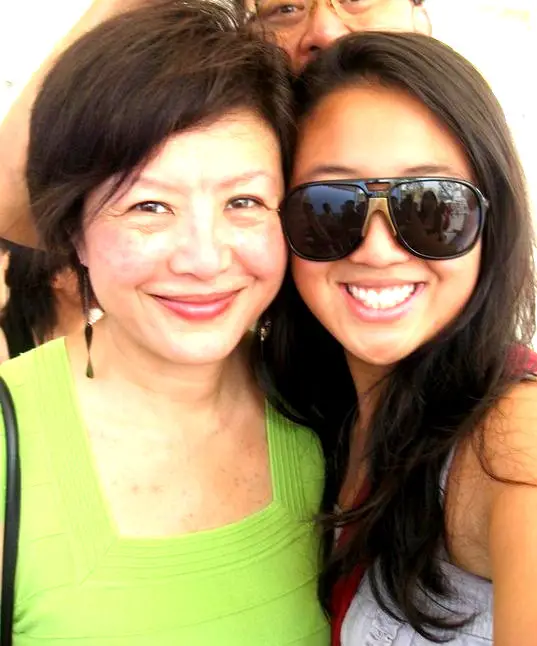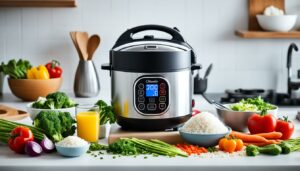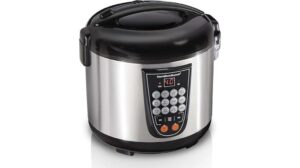You know, it often seems like a simple task to cook rice, but many people still struggle with achieving perfectly cooked rice every time.
Happily, using a rice cooker can make the process easier, but there are still common mistakes that can lead to overcooked, undercooked, or even burnt rice.
In this article, I will provide expert tips and techniques to help you troubleshoot common rice cooker mistakes and achieve perfectly cooked rice every time.
Table of Contents
Key Takeaways
- Cooking rice to perfection requires attention to detail and avoiding common mistakes that can ruin the quality of the rice.
- Understanding the basics of rice cooking, including water-to-rice ratio and cooking time, is crucial for achieving perfect results.
- Common rice cooker problems, such as overcooking and undercooking, can be easily remedied with a few adjustments to the cooking process.
Understanding Rice Cooking Basics
Cooking rice perfectly requires an understanding of the basics. The following tips will help you achieve delicious, fluffy rice every time:
- Rinse the rice: Before cooking, rinse the rice thoroughly with water to remove excess starch and impurities. Use a fine-mesh sieve to avoid losing any grains.
- Water-to-rice ratio: The water-to-rice ratio is crucial for perfectly cooked rice. Use the ratio of 1:1.5 (one cup of rice to one and a half cups of water) for white rice, and 1:2 (one cup of rice to two cups of water) for brown rice.
- Cooking time: The cooking time depends on the type of rice and the desired texture. White rice generally takes around 18-20 minutes to cook, while brown rice takes around 30-40 minutes. Follow the instructions on your rice cooker or adjust the time based on your preferences.
Additional Tips for Cooking Rice Perfectly
Here are some expert tips that I have developed over the years to further enhance your rice cooking experience:
- Let it rest: Once the rice is cooked, let it rest for a few minutes before fluffing it with a fork. This will allow any excess moisture to evaporate and prevent the rice from becoming sticky.
- Don’t lift the lid: Avoid lifting the lid of the rice cooker before the cooking process is complete. This can cause the steam to escape, affecting the cooking time and texture of the rice.
- Use the right utensils: Use a non-stick spatula or a wooden spoon to fluff and stir the rice. Avoid using metal utensils, which can scratch the rice cooker’s non-stick coating and affect its performance.
Simple Problems and How to Avoid Them
As we know, rice cookers are a convenient way to make perfect rice every time, but they can also be the source of common cooking mistakes. Here are some of the most common issues that arise when using a rice cooker and how to troubleshoot them:
Rice Sticking to the Bottom of the Pot
One of the most common problems when cooking rice in a rice cooker is that the rice can stick to the bottom of the pot, resulting in burnt or partially cooked rice. To prevent this, it’s important to properly clean and oil the rice cooker pot before cooking. Another solution is to add a tablespoon of oil to the rice and water mixture before cooking. Make sure to fluff the rice with a fork immediately after cooking to prevent clumping and sticking.
Undercooked Rice
When rice comes out undercooked, it can be hard and crunchy, making it almost impossible to eat. To avoid this, it’s important to use the correct water-to-rice ratio and cooking time. If the rice cooker turns off before the rice is fully cooked, add an additional 1/4 cup of water and let it sit on warm for an additional 10-15 minutes. Another solution is to soak the rice for 20-30 minutes before cooking, which can help it cook more evenly.
Overcooked Rice
Overcooked rice can be mushy and lack flavor. To salvage overcooked rice and make it edible again, try adding a tablespoon of butter or oil to the rice and fluffing it with a fork. You can also remove the excess water by placing the rice in a colander and running it under cold water for a few seconds. Avoid stirring the rice too much as it can cause it to become even more mushy.
By understanding these common mistakes and how to avoid or fix them, you can achieve perfectly cooked rice every time in your rice cooker.
Overcoming Rice Sticking to the Bottom of the Pot
Rice sticking to the bottom of the pot is a common problem that can ruin an entire batch of rice. Fortunately, there are several techniques to prevent this issue and ensure that the rice cooks evenly.
Rinse the rice: Before cooking the rice, be sure to rinse it thoroughly to remove any excess starch. This will prevent the rice from sticking together and to the bottom of the pot.
| Step | Instructions |
|---|---|
| 1 | Measure the rice and rinse it in cold water. |
| 2 | Fill the pot with water and let the rice soak for 20-30 minutes. |
| 3 | Drain the rice and rinse it again. |
Use the right amount of water: Using too little water can cause the rice to stick to the bottom of the pot.
Do not lift the lid: Avoid lifting the lid of the rice cooker during the cooking process. This can release steam and disrupt the cooking process, leading to rice sticking to the bottom of the pot.
Add oil or butter: Adding a small amount of oil or butter to the rice cooking water can also help prevent rice from sticking to the bottom of the pot.
If the rice has already stuck to the bottom of the pot, do not scrape it off. This can damage the non-stick surface of the pot and affect future batches of rice. Instead, let the rice cool and soak the pot in warm, soapy water for several hours. The rice should then be easy to remove with a soft sponge or brush.
By following these tips and techniques, you can prevent rice from sticking to the bottom of the pot and achieve perfectly cooked rice every time.
Dealing with Undercooked Rice
Undercooked rice can be frustrating and unappetizing. If your rice comes out too firm or crunchy, there are a few possible reasons.
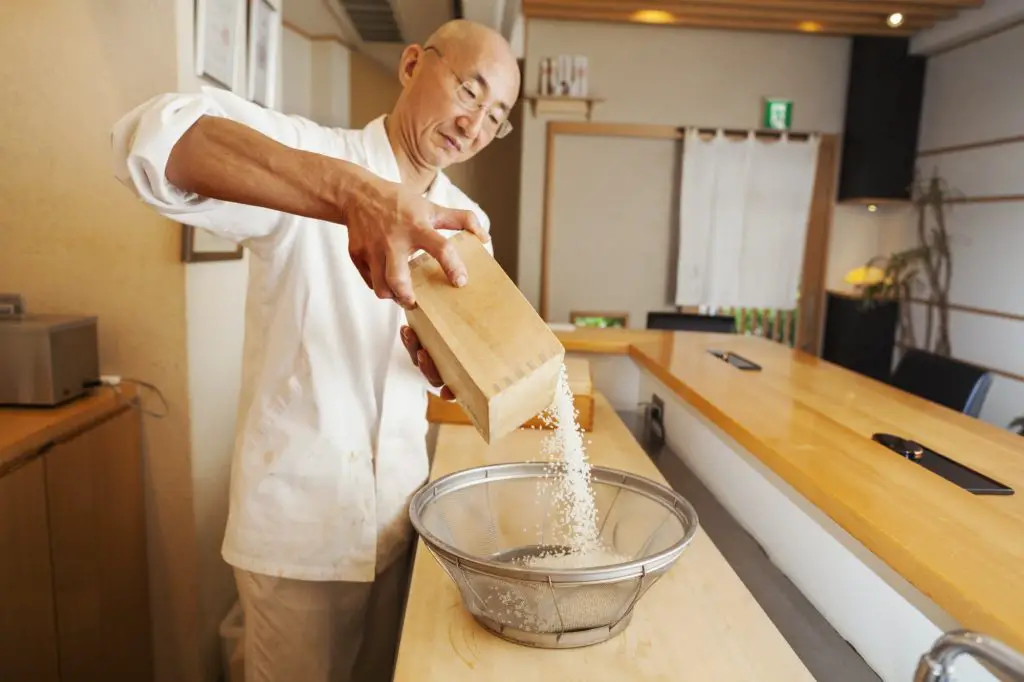
Firstly, double check your water-to-rice ratio. If you are using too little water, the rice won’t cook properly. Typically, the ideal water-to-rice ratio is 1.5 cups of water for every cup of rice. However, this can vary depending on the type of rice you are using.
Another reason for undercooked rice could be a lack of cooking time. After the rice cooker switches to “keep warm” mode, let it sit for an extra 10-15 minutes to ensure that the rice is fully cooked and the water is absorbed.
Adjusting the Water-to-Rice Ratio
If your rice is undercooked and has already been sitting in the cooker, you can add more water and give it additional cooking time. Depending on the quantity of rice, add a quarter to half a cup of water and cook it for an additional 5-10 minutes.
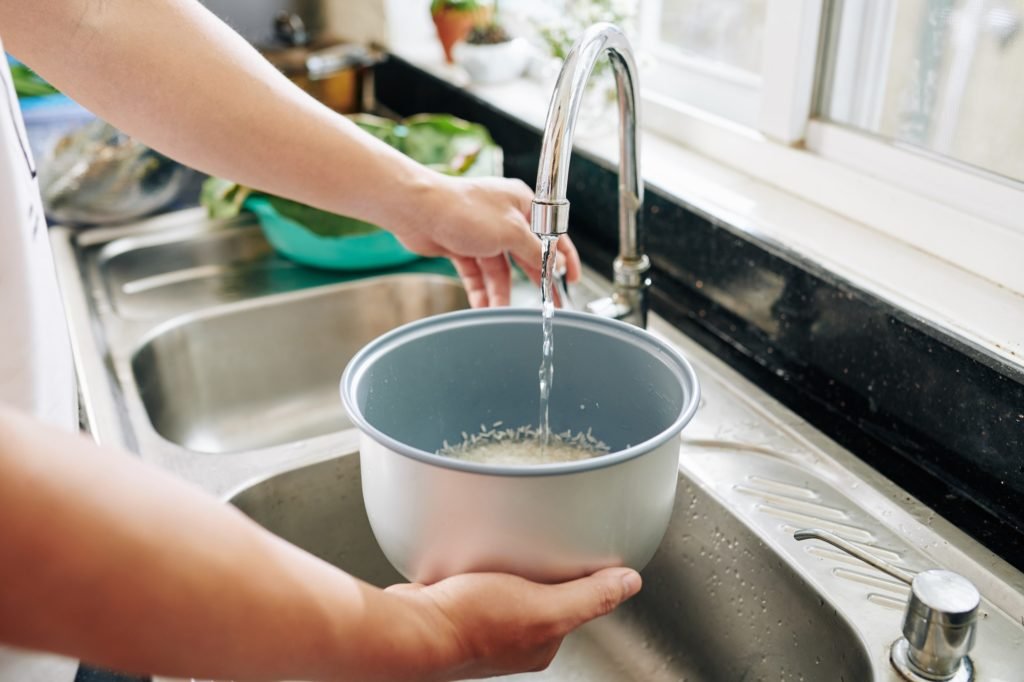
It’s important to note that adding too much water can result in overcooked rice, so adjust the water incrementally and keep track of the cooking time.
Another trick to fix undercooked rice is to microwave it with a bit of water. Place the undercooked rice in a microwave-safe dish, add a tablespoon of water for every cup of rice, and cover it with a damp paper towel. Microwave on high for one minute, stir, and microwave for another minute. Repeat until the rice reaches the desired texture.
By following these tips, you’ll be able to achieve perfectly cooked rice every time.
Fixing Overcooked Rice
Overcooked rice can be salvaged with a few simple tips and techniques. The key to fixing overcooked rice is to restore its texture and flavor.
Technique 1: Steam the Rice
One technique to fix overcooked rice is to steam it. To do this, add a small amount of water to the rice in the rice cooker pot and mix it with a fork. Then, cover the pot with a lid or aluminum foil and let it steam on low heat for a few minutes. This will help the rice regain its moisture and texture.
Technique 2: Add Moisture
Adding a small amount of moisture can also help fix overcooked rice. You can do this by adding a little bit of water or broth to the rice and mixing it in. Alternatively, you can add a small amount of butter or oil to the rice to help lubricate it and restore its texture.
Technique 3: Add Flavors
If your overcooked rice is lacking in flavor, you can add herbs or spices to enhance its taste. You can also add diced vegetables or cooked meat to the rice to make it a more complete dish.
Technique 4: Make Rice Pudding
If all else fails, turn your overcooked rice into a delicious dessert by making rice pudding. Simply add milk, sugar, and your favorite flavorings to the rice and simmer until it thickens and becomes creamy.
These tips and techniques can help you salvage overcooked rice and turn it into a delicious and satisfying meal. With a little bit of creativity and experimentation, you can fix any rice cooker mistake and achieve perfectly cooked rice every time.
Achieving Perfectly Flavored Rice
While perfectly cooked rice can be delicious on its own, adding the right ingredients and seasonings can take it to the next level. Here are some tips for achieving perfectly flavored rice:
- Chicken broth: Replace some or all of the water in your recipe with chicken broth for a savory flavor.
- Coconut milk: For a creamy and slightly sweet flavor, try using coconut milk instead of water in your recipe.
- Herbs and spices: Add dried or fresh herbs like thyme, rosemary, or basil to your rice for a burst of flavor. Spices like cumin, turmeric, and paprika can also add depth and warmth to your rice.
- Vegetables: Finely chopped vegetables like onions, garlic, and carrots can be sautéed and added to the rice for extra flavor and nutrition.
It’s important to note that when adding additional ingredients to your rice, you may need to adjust the water-to-rice ratio and cooking time to achieve the desired consistency. Be sure to taste your rice before serving and adjust seasoning as necessary.
Importance of Proper Rice Storage
Storing rice properly is crucial to maintaining its quality, and freshness, and preventing spoilage. Here’s what you need to know:
- Store uncooked rice in a cool, dry place: Keep the rice away from heat, moisture, and sunlight as they can cause it to spoil. Store it in an airtight container and avoid storing it in the fridge as it can cause the rice to dry out and become hard.
- Store cooked rice immediately: If you have leftover cooked rice, store it in an airtight container in the fridge within two hours of cooking. You can also freeze cooked rice for later use.
- Refrigerate or freeze cooked rice: Stored cooked rice in the fridge can last up to four days while frozen rice can last up to six months. Be sure to reheat the rice thoroughly before serving and avoid reheating it more than once to prevent bacterial growth.
By following these simple guidelines, you can ensure that your rice stays fresh and safe to eat, allowing you to enjoy perfectly cooked rice every time.
Troubleshooting Additional Rice Cooker Issues
In addition to the common problems discussed earlier, there are a few other issues that can arise when cooking rice in a rice cooker. Here are some tips and techniques to troubleshoot these problems:
Uneven Cooking
If you notice that some parts of the rice are overcooked while others are undercooked, the problem may be due to uneven distribution of water and heat in the rice cooker. To avoid this issue, make sure to rinse the rice thoroughly before cooking to remove any excess starch that can cause clumping. Also, avoid stirring the rice while it’s cooking, as this can disrupt the even distribution of heat.
Improper Steaming
If you find that your rice comes out too wet or dry, the problem may be due to the steaming process. To ensure proper steaming, never lift the lid of the rice cooker while the rice is cooking, as this can release the steam and lead to uneven cooking. Also, make sure to let the rice sit in the cooker for a few minutes after it’s done cooking to allow the steam to continue cooking the rice evenly.
Conclusion
By following these tips and techniques, you can troubleshoot any issues you may encounter when cooking rice in a rice cooker. Remember to rinse the rice before cooking, use the correct water-to-rice ratio, and avoid stirring or opening the lid while the rice is cooking. With a little practice, you can master the art of cooking perfectly fluffy and delicious rice every time.
Conclusion
In conclusion, cooking rice to perfection is a skill that can be easily mastered with the right knowledge and techniques. By understanding the basics of rice cooking, you can avoid common mistakes and achieve perfectly fluffy and delicious rice every time. Remember to rinse your rice, use the correct water-to-rice ratio, and adjust the cooking time as needed.
Additionally, troubleshooting common rice cooker problems can ensure that your rice is cooked evenly and without sticking to the pot. Whether you are dealing with undercooked or overcooked rice, there are techniques to salvage your rice and restore its texture and flavor.
Proper rice storage is also important to maintain the quality and safety of your rice. Make sure to store your cooked and uncooked rice in airtight containers in a cool, dry place.
By following these tips and techniques, you can become an expert at cooking perfectly flavored and textured rice. Remember to experiment with different flavor profiles and ingredients to create a dish that suits your preferences.
We hope this article has been helpful in troubleshooting your common rice cooker mistakes. Apply these techniques to your next rice dish and impress your family and friends with perfectly cooked rice every time.
FAQ
Q: Why is it important to cook rice perfectly?
A: Cooking rice perfectly ensures that it has the right texture and flavor. Undercooked or overcooked rice can be unpleasant to eat and may ruin the overall dish.
Q: What are some common mistakes when using a rice cooker?
A: Some common mistakes when using a rice cooker include using the wrong water-to-rice ratio, not rinsing the rice before cooking, and not properly adjusting the cooking time.
Q: How do I achieve perfectly cooked rice?
A: To achieve perfectly cooked rice, make sure to rinse the rice before cooking, use the correct water-to-rice ratio, and adjust the cooking time based on the type of rice being cooked.
Q: How can I prevent rice from sticking to the bottom of the pot?
A: To prevent rice from sticking to the bottom of the pot, make sure to rinse the rice thoroughly before cooking, use a non-stick pot, and avoid stirring the rice during the cooking process.
Q: What should I do if my rice is undercooked?
A: If your rice is undercooked, you can add some additional water and continue cooking until it reaches the desired texture. Alternatively, you can transfer the rice to a pot and cook it on the stove.
Q: How can I salvage overcooked rice?
A: To salvage overcooked rice, you can add a little bit of water or broth and steam it for a few minutes. This will help to restore some moisture and improve the texture.
Q: How can I add flavor to my rice?
A: You can add flavor to your rice by incorporating ingredients such as herbs, spices, broth, or vegetables during the cooking process. You can also season the cooked rice with sauces or condiments.
Q: How should I store cooked and uncooked rice?
A: Cooked rice should be stored in an airtight container in the refrigerator for up to 4 days. Uncooked rice should be stored in a cool, dry place, away from moisture and pests.
Q: What can I do if my rice cooker is not cooking evenly?
A: If your rice cooker is not cooking evenly, try stirring the rice halfway through the cooking process to distribute the heat more evenly. You can also try adjusting the water-to-rice ratio.
Q: How can I improve the steaming function of my rice cooker?
A: To improve the steaming function of your rice cooker, make sure to add enough water to generate sufficient steam. You can also place a clean towel or cloth over the pot to prevent steam from escaping.

